Leadership Theory and Practice: A Reflective Essay on BUMGT5970
VerifiedAdded on 2023/03/30
|15
|3530
|335
Essay
AI Summary
This reflective essay delves into the complexities of leadership, examining the author's evolving understanding from the course BUMGT5970. The essay begins with an introduction to leadership definitions and progresses through a personal observation and analysis section, focusing on key themes such as ethical considerations, organizational culture, and international approaches to leadership. The author discusses how their initial definition of leadership has been altered by academic perspectives and theoretical frameworks, and provides specific examples from class activities, films, and current business examples. The analysis explores the influence of values, ethics, and cultural dynamics on leadership styles. The essay also reflects on the implications of these learnings for the author's future career and discusses personal leadership development opportunities. The author emphasizes the importance of decision-making, planning, and ethical behavior in contemporary leadership, while also highlighting the significance of market-oriented organizational cultures. The essay concludes with a critical discussion of personal leadership development and how class learnings can improve leadership perspective skills throughout their working life, providing a comprehensive overview of the course's impact on the author's leadership philosophy.
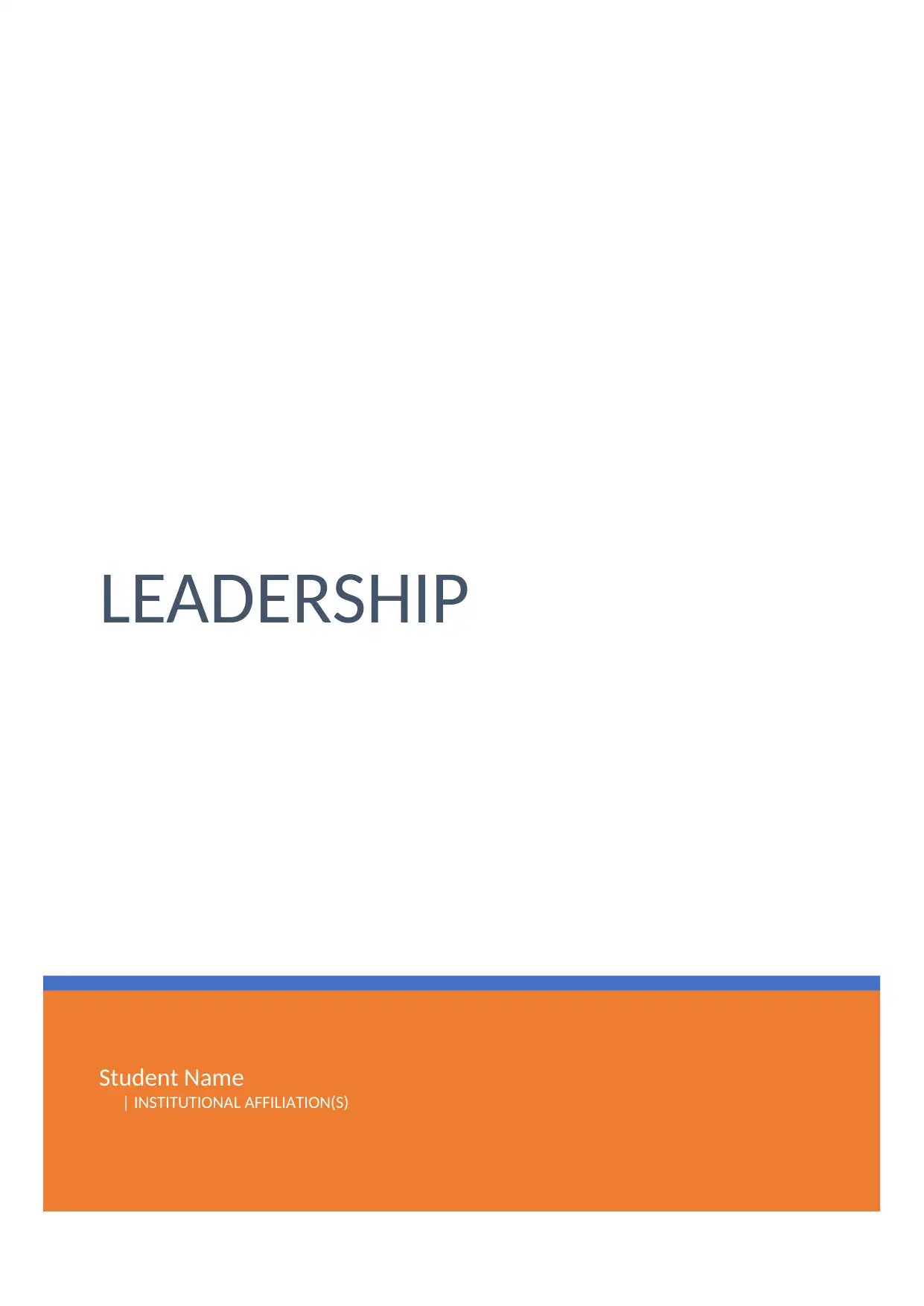
Student Name
| INSTITUTIONAL AFFILIATION(S)
LEADERSHIP
| INSTITUTIONAL AFFILIATION(S)
LEADERSHIP
Paraphrase This Document
Need a fresh take? Get an instant paraphrase of this document with our AI Paraphraser
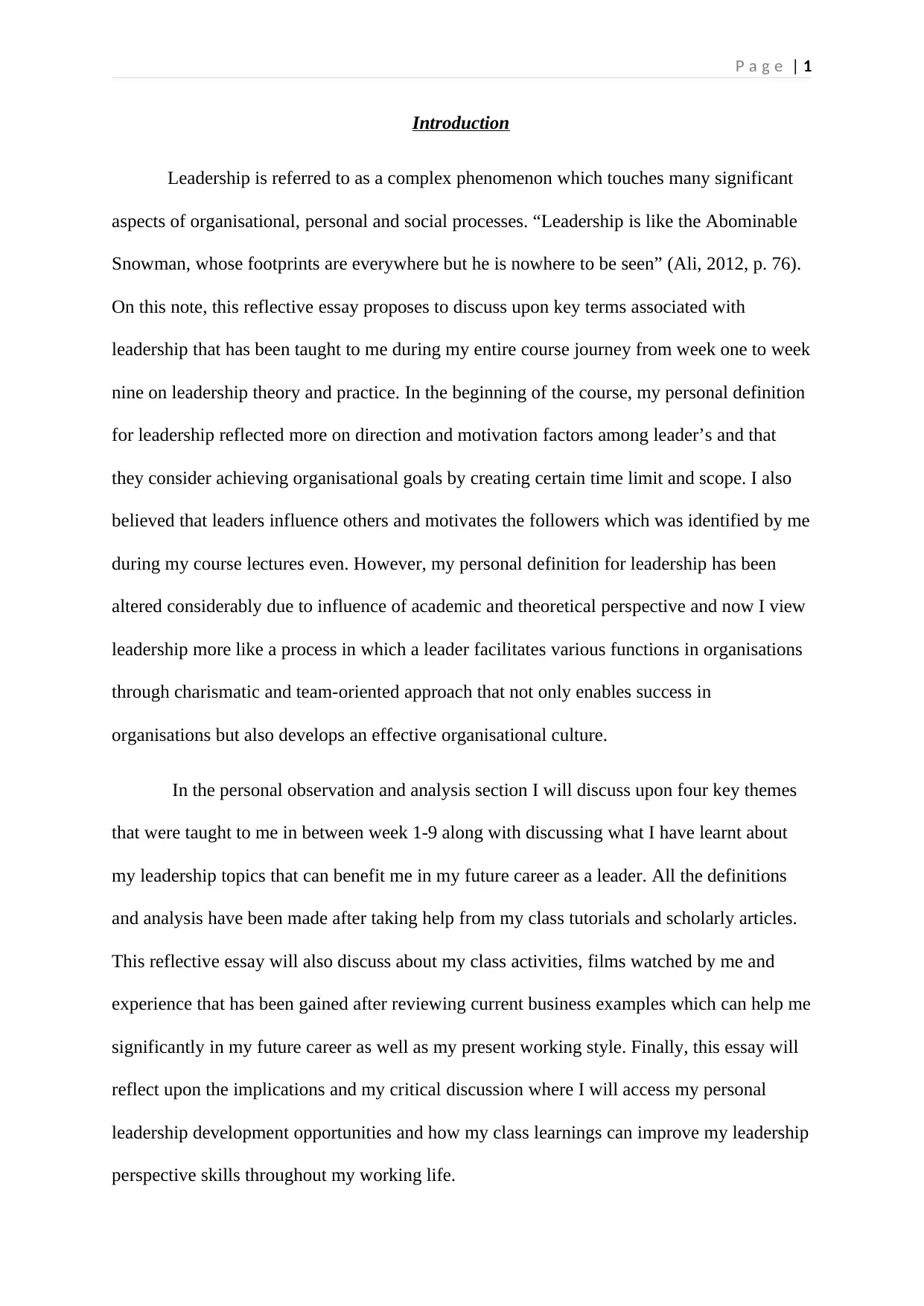
P a g e | 1
Introduction
Leadership is referred to as a complex phenomenon which touches many significant
aspects of organisational, personal and social processes. “Leadership is like the Abominable
Snowman, whose footprints are everywhere but he is nowhere to be seen” (Ali, 2012, p. 76).
On this note, this reflective essay proposes to discuss upon key terms associated with
leadership that has been taught to me during my entire course journey from week one to week
nine on leadership theory and practice. In the beginning of the course, my personal definition
for leadership reflected more on direction and motivation factors among leader’s and that
they consider achieving organisational goals by creating certain time limit and scope. I also
believed that leaders influence others and motivates the followers which was identified by me
during my course lectures even. However, my personal definition for leadership has been
altered considerably due to influence of academic and theoretical perspective and now I view
leadership more like a process in which a leader facilitates various functions in organisations
through charismatic and team-oriented approach that not only enables success in
organisations but also develops an effective organisational culture.
In the personal observation and analysis section I will discuss upon four key themes
that were taught to me in between week 1-9 along with discussing what I have learnt about
my leadership topics that can benefit me in my future career as a leader. All the definitions
and analysis have been made after taking help from my class tutorials and scholarly articles.
This reflective essay will also discuss about my class activities, films watched by me and
experience that has been gained after reviewing current business examples which can help me
significantly in my future career as well as my present working style. Finally, this essay will
reflect upon the implications and my critical discussion where I will access my personal
leadership development opportunities and how my class learnings can improve my leadership
perspective skills throughout my working life.
Introduction
Leadership is referred to as a complex phenomenon which touches many significant
aspects of organisational, personal and social processes. “Leadership is like the Abominable
Snowman, whose footprints are everywhere but he is nowhere to be seen” (Ali, 2012, p. 76).
On this note, this reflective essay proposes to discuss upon key terms associated with
leadership that has been taught to me during my entire course journey from week one to week
nine on leadership theory and practice. In the beginning of the course, my personal definition
for leadership reflected more on direction and motivation factors among leader’s and that
they consider achieving organisational goals by creating certain time limit and scope. I also
believed that leaders influence others and motivates the followers which was identified by me
during my course lectures even. However, my personal definition for leadership has been
altered considerably due to influence of academic and theoretical perspective and now I view
leadership more like a process in which a leader facilitates various functions in organisations
through charismatic and team-oriented approach that not only enables success in
organisations but also develops an effective organisational culture.
In the personal observation and analysis section I will discuss upon four key themes
that were taught to me in between week 1-9 along with discussing what I have learnt about
my leadership topics that can benefit me in my future career as a leader. All the definitions
and analysis have been made after taking help from my class tutorials and scholarly articles.
This reflective essay will also discuss about my class activities, films watched by me and
experience that has been gained after reviewing current business examples which can help me
significantly in my future career as well as my present working style. Finally, this essay will
reflect upon the implications and my critical discussion where I will access my personal
leadership development opportunities and how my class learnings can improve my leadership
perspective skills throughout my working life.
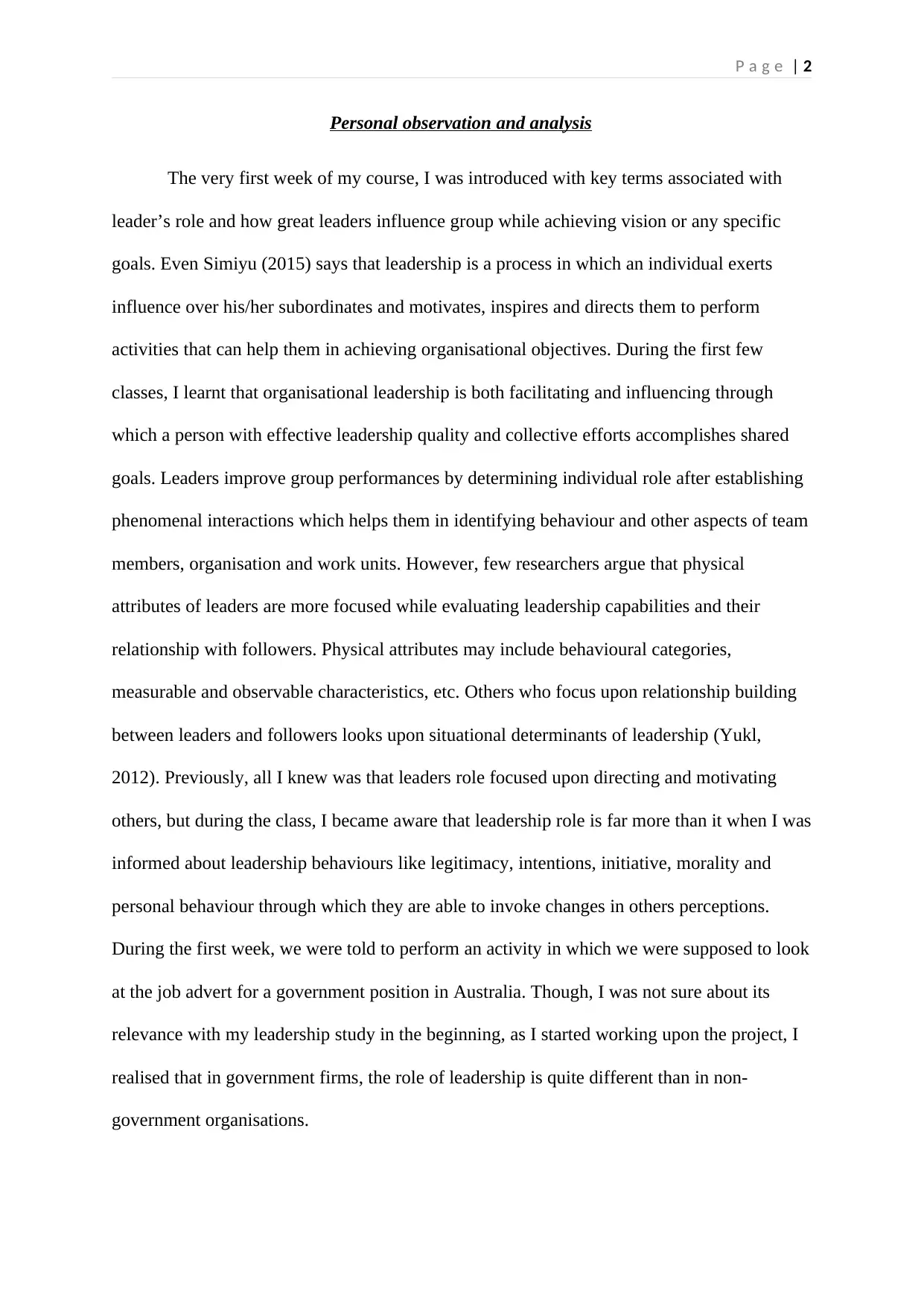
P a g e | 2
Personal observation and analysis
The very first week of my course, I was introduced with key terms associated with
leader’s role and how great leaders influence group while achieving vision or any specific
goals. Even Simiyu (2015) says that leadership is a process in which an individual exerts
influence over his/her subordinates and motivates, inspires and directs them to perform
activities that can help them in achieving organisational objectives. During the first few
classes, I learnt that organisational leadership is both facilitating and influencing through
which a person with effective leadership quality and collective efforts accomplishes shared
goals. Leaders improve group performances by determining individual role after establishing
phenomenal interactions which helps them in identifying behaviour and other aspects of team
members, organisation and work units. However, few researchers argue that physical
attributes of leaders are more focused while evaluating leadership capabilities and their
relationship with followers. Physical attributes may include behavioural categories,
measurable and observable characteristics, etc. Others who focus upon relationship building
between leaders and followers looks upon situational determinants of leadership (Yukl,
2012). Previously, all I knew was that leaders role focused upon directing and motivating
others, but during the class, I became aware that leadership role is far more than it when I was
informed about leadership behaviours like legitimacy, intentions, initiative, morality and
personal behaviour through which they are able to invoke changes in others perceptions.
During the first week, we were told to perform an activity in which we were supposed to look
at the job advert for a government position in Australia. Though, I was not sure about its
relevance with my leadership study in the beginning, as I started working upon the project, I
realised that in government firms, the role of leadership is quite different than in non-
government organisations.
Personal observation and analysis
The very first week of my course, I was introduced with key terms associated with
leader’s role and how great leaders influence group while achieving vision or any specific
goals. Even Simiyu (2015) says that leadership is a process in which an individual exerts
influence over his/her subordinates and motivates, inspires and directs them to perform
activities that can help them in achieving organisational objectives. During the first few
classes, I learnt that organisational leadership is both facilitating and influencing through
which a person with effective leadership quality and collective efforts accomplishes shared
goals. Leaders improve group performances by determining individual role after establishing
phenomenal interactions which helps them in identifying behaviour and other aspects of team
members, organisation and work units. However, few researchers argue that physical
attributes of leaders are more focused while evaluating leadership capabilities and their
relationship with followers. Physical attributes may include behavioural categories,
measurable and observable characteristics, etc. Others who focus upon relationship building
between leaders and followers looks upon situational determinants of leadership (Yukl,
2012). Previously, all I knew was that leaders role focused upon directing and motivating
others, but during the class, I became aware that leadership role is far more than it when I was
informed about leadership behaviours like legitimacy, intentions, initiative, morality and
personal behaviour through which they are able to invoke changes in others perceptions.
During the first week, we were told to perform an activity in which we were supposed to look
at the job advert for a government position in Australia. Though, I was not sure about its
relevance with my leadership study in the beginning, as I started working upon the project, I
realised that in government firms, the role of leadership is quite different than in non-
government organisations.
⊘ This is a preview!⊘
Do you want full access?
Subscribe today to unlock all pages.

Trusted by 1+ million students worldwide
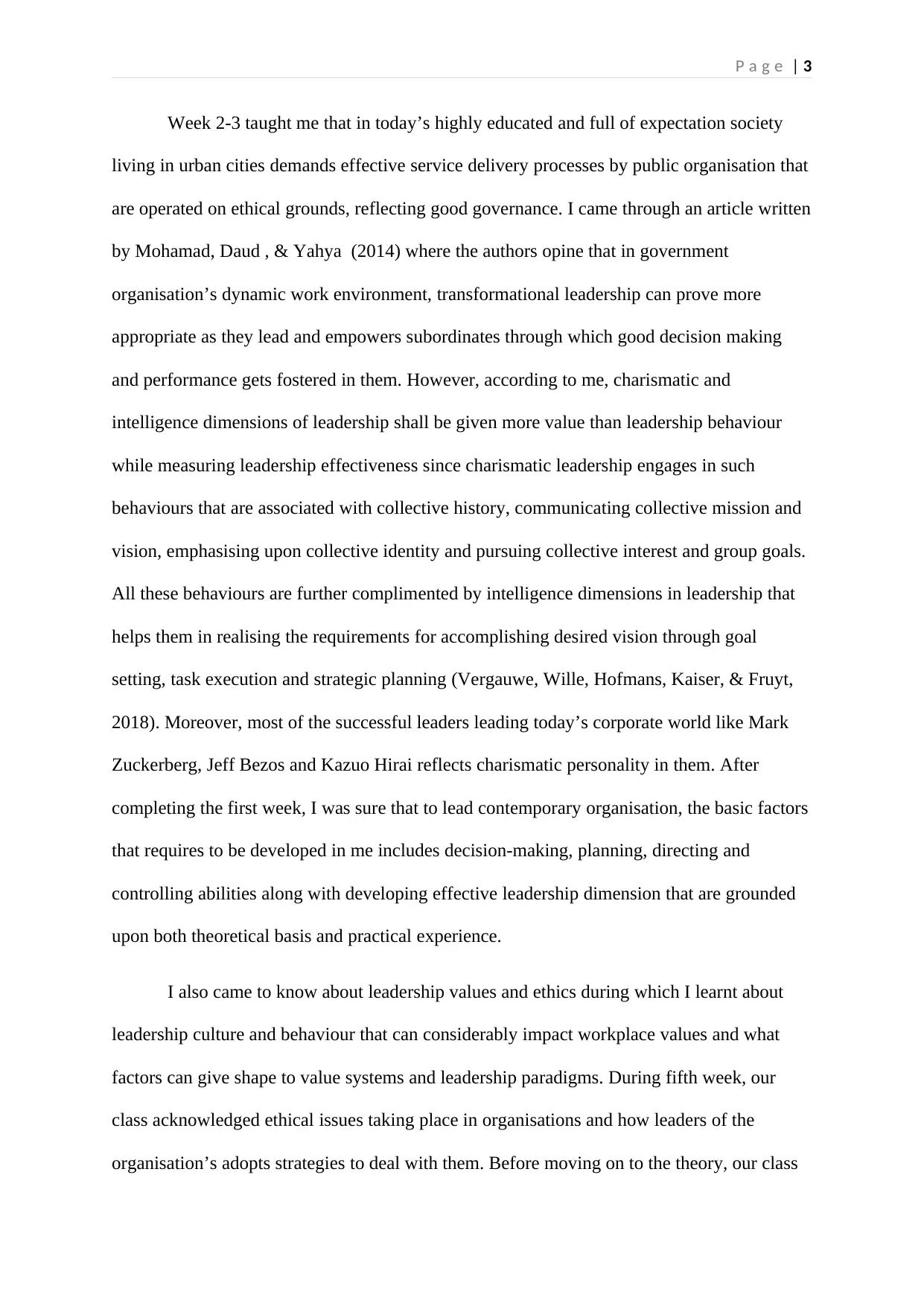
P a g e | 3
Week 2-3 taught me that in today’s highly educated and full of expectation society
living in urban cities demands effective service delivery processes by public organisation that
are operated on ethical grounds, reflecting good governance. I came through an article written
by Mohamad, Daud , & Yahya (2014) where the authors opine that in government
organisation’s dynamic work environment, transformational leadership can prove more
appropriate as they lead and empowers subordinates through which good decision making
and performance gets fostered in them. However, according to me, charismatic and
intelligence dimensions of leadership shall be given more value than leadership behaviour
while measuring leadership effectiveness since charismatic leadership engages in such
behaviours that are associated with collective history, communicating collective mission and
vision, emphasising upon collective identity and pursuing collective interest and group goals.
All these behaviours are further complimented by intelligence dimensions in leadership that
helps them in realising the requirements for accomplishing desired vision through goal
setting, task execution and strategic planning (Vergauwe, Wille, Hofmans, Kaiser, & Fruyt,
2018). Moreover, most of the successful leaders leading today’s corporate world like Mark
Zuckerberg, Jeff Bezos and Kazuo Hirai reflects charismatic personality in them. After
completing the first week, I was sure that to lead contemporary organisation, the basic factors
that requires to be developed in me includes decision-making, planning, directing and
controlling abilities along with developing effective leadership dimension that are grounded
upon both theoretical basis and practical experience.
I also came to know about leadership values and ethics during which I learnt about
leadership culture and behaviour that can considerably impact workplace values and what
factors can give shape to value systems and leadership paradigms. During fifth week, our
class acknowledged ethical issues taking place in organisations and how leaders of the
organisation’s adopts strategies to deal with them. Before moving on to the theory, our class
Week 2-3 taught me that in today’s highly educated and full of expectation society
living in urban cities demands effective service delivery processes by public organisation that
are operated on ethical grounds, reflecting good governance. I came through an article written
by Mohamad, Daud , & Yahya (2014) where the authors opine that in government
organisation’s dynamic work environment, transformational leadership can prove more
appropriate as they lead and empowers subordinates through which good decision making
and performance gets fostered in them. However, according to me, charismatic and
intelligence dimensions of leadership shall be given more value than leadership behaviour
while measuring leadership effectiveness since charismatic leadership engages in such
behaviours that are associated with collective history, communicating collective mission and
vision, emphasising upon collective identity and pursuing collective interest and group goals.
All these behaviours are further complimented by intelligence dimensions in leadership that
helps them in realising the requirements for accomplishing desired vision through goal
setting, task execution and strategic planning (Vergauwe, Wille, Hofmans, Kaiser, & Fruyt,
2018). Moreover, most of the successful leaders leading today’s corporate world like Mark
Zuckerberg, Jeff Bezos and Kazuo Hirai reflects charismatic personality in them. After
completing the first week, I was sure that to lead contemporary organisation, the basic factors
that requires to be developed in me includes decision-making, planning, directing and
controlling abilities along with developing effective leadership dimension that are grounded
upon both theoretical basis and practical experience.
I also came to know about leadership values and ethics during which I learnt about
leadership culture and behaviour that can considerably impact workplace values and what
factors can give shape to value systems and leadership paradigms. During fifth week, our
class acknowledged ethical issues taking place in organisations and how leaders of the
organisation’s adopts strategies to deal with them. Before moving on to the theory, our class
Paraphrase This Document
Need a fresh take? Get an instant paraphrase of this document with our AI Paraphraser
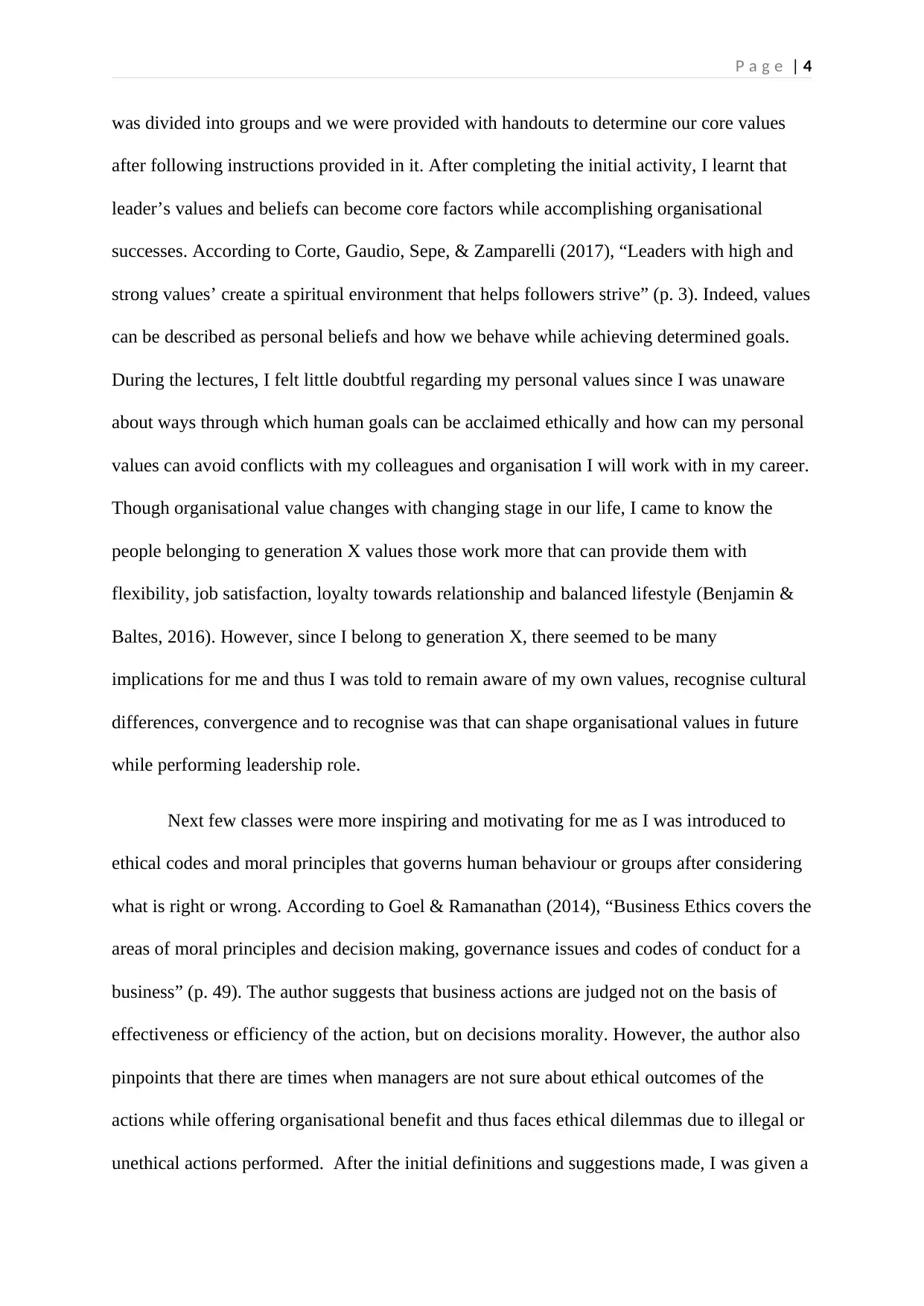
P a g e | 4
was divided into groups and we were provided with handouts to determine our core values
after following instructions provided in it. After completing the initial activity, I learnt that
leader’s values and beliefs can become core factors while accomplishing organisational
successes. According to Corte, Gaudio, Sepe, & Zamparelli (2017), “Leaders with high and
strong values’ create a spiritual environment that helps followers strive” (p. 3). Indeed, values
can be described as personal beliefs and how we behave while achieving determined goals.
During the lectures, I felt little doubtful regarding my personal values since I was unaware
about ways through which human goals can be acclaimed ethically and how can my personal
values can avoid conflicts with my colleagues and organisation I will work with in my career.
Though organisational value changes with changing stage in our life, I came to know the
people belonging to generation X values those work more that can provide them with
flexibility, job satisfaction, loyalty towards relationship and balanced lifestyle (Benjamin &
Baltes, 2016). However, since I belong to generation X, there seemed to be many
implications for me and thus I was told to remain aware of my own values, recognise cultural
differences, convergence and to recognise was that can shape organisational values in future
while performing leadership role.
Next few classes were more inspiring and motivating for me as I was introduced to
ethical codes and moral principles that governs human behaviour or groups after considering
what is right or wrong. According to Goel & Ramanathan (2014), “Business Ethics covers the
areas of moral principles and decision making, governance issues and codes of conduct for a
business” (p. 49). The author suggests that business actions are judged not on the basis of
effectiveness or efficiency of the action, but on decisions morality. However, the author also
pinpoints that there are times when managers are not sure about ethical outcomes of the
actions while offering organisational benefit and thus faces ethical dilemmas due to illegal or
unethical actions performed. After the initial definitions and suggestions made, I was given a
was divided into groups and we were provided with handouts to determine our core values
after following instructions provided in it. After completing the initial activity, I learnt that
leader’s values and beliefs can become core factors while accomplishing organisational
successes. According to Corte, Gaudio, Sepe, & Zamparelli (2017), “Leaders with high and
strong values’ create a spiritual environment that helps followers strive” (p. 3). Indeed, values
can be described as personal beliefs and how we behave while achieving determined goals.
During the lectures, I felt little doubtful regarding my personal values since I was unaware
about ways through which human goals can be acclaimed ethically and how can my personal
values can avoid conflicts with my colleagues and organisation I will work with in my career.
Though organisational value changes with changing stage in our life, I came to know the
people belonging to generation X values those work more that can provide them with
flexibility, job satisfaction, loyalty towards relationship and balanced lifestyle (Benjamin &
Baltes, 2016). However, since I belong to generation X, there seemed to be many
implications for me and thus I was told to remain aware of my own values, recognise cultural
differences, convergence and to recognise was that can shape organisational values in future
while performing leadership role.
Next few classes were more inspiring and motivating for me as I was introduced to
ethical codes and moral principles that governs human behaviour or groups after considering
what is right or wrong. According to Goel & Ramanathan (2014), “Business Ethics covers the
areas of moral principles and decision making, governance issues and codes of conduct for a
business” (p. 49). The author suggests that business actions are judged not on the basis of
effectiveness or efficiency of the action, but on decisions morality. However, the author also
pinpoints that there are times when managers are not sure about ethical outcomes of the
actions while offering organisational benefit and thus faces ethical dilemmas due to illegal or
unethical actions performed. After the initial definitions and suggestions made, I was given a
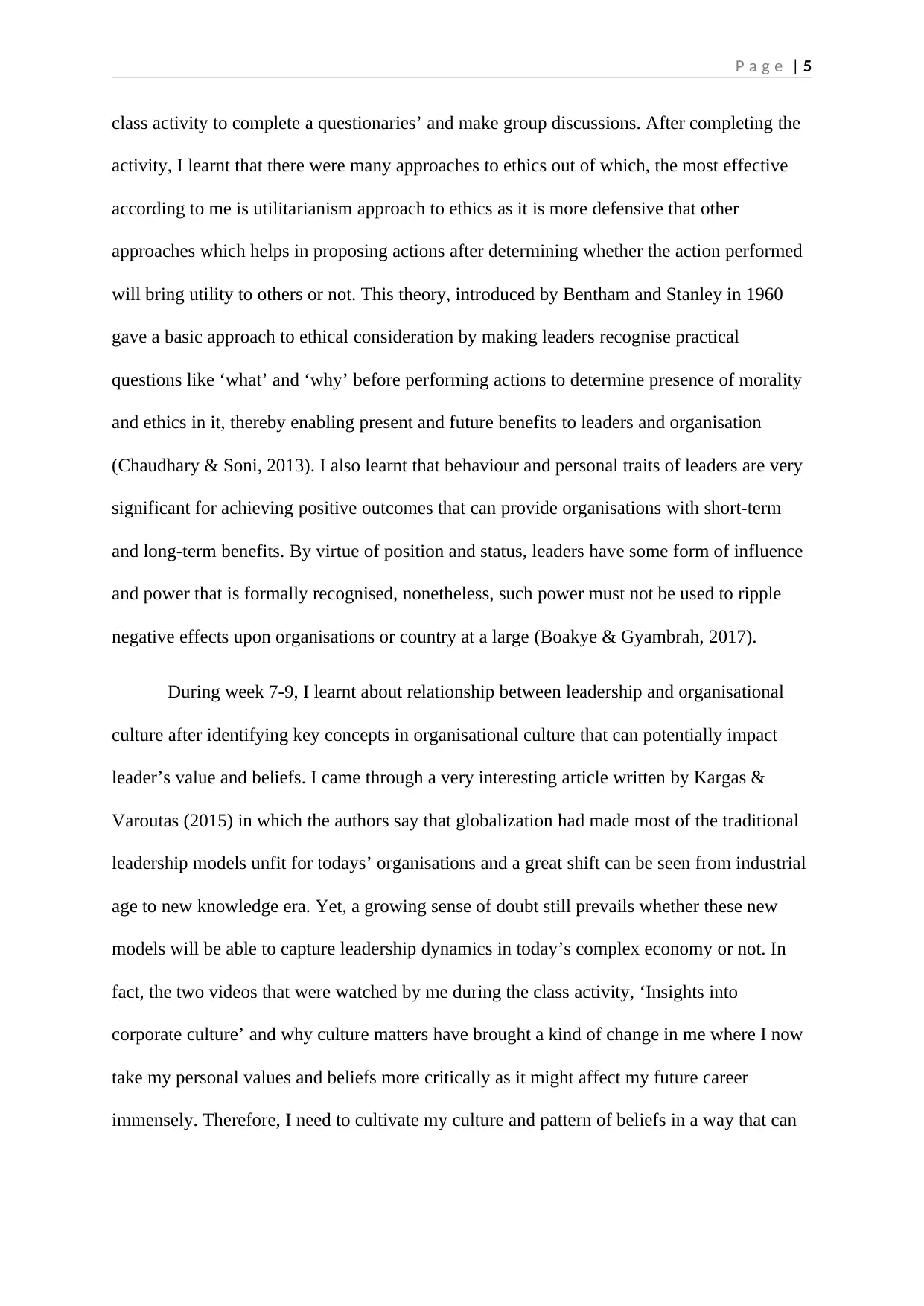
P a g e | 5
class activity to complete a questionaries’ and make group discussions. After completing the
activity, I learnt that there were many approaches to ethics out of which, the most effective
according to me is utilitarianism approach to ethics as it is more defensive that other
approaches which helps in proposing actions after determining whether the action performed
will bring utility to others or not. This theory, introduced by Bentham and Stanley in 1960
gave a basic approach to ethical consideration by making leaders recognise practical
questions like ‘what’ and ‘why’ before performing actions to determine presence of morality
and ethics in it, thereby enabling present and future benefits to leaders and organisation
(Chaudhary & Soni, 2013). I also learnt that behaviour and personal traits of leaders are very
significant for achieving positive outcomes that can provide organisations with short-term
and long-term benefits. By virtue of position and status, leaders have some form of influence
and power that is formally recognised, nonetheless, such power must not be used to ripple
negative effects upon organisations or country at a large (Boakye & Gyambrah, 2017).
During week 7-9, I learnt about relationship between leadership and organisational
culture after identifying key concepts in organisational culture that can potentially impact
leader’s value and beliefs. I came through a very interesting article written by Kargas &
Varoutas (2015) in which the authors say that globalization had made most of the traditional
leadership models unfit for todays’ organisations and a great shift can be seen from industrial
age to new knowledge era. Yet, a growing sense of doubt still prevails whether these new
models will be able to capture leadership dynamics in today’s complex economy or not. In
fact, the two videos that were watched by me during the class activity, ‘Insights into
corporate culture’ and why culture matters have brought a kind of change in me where I now
take my personal values and beliefs more critically as it might affect my future career
immensely. Therefore, I need to cultivate my culture and pattern of beliefs in a way that can
class activity to complete a questionaries’ and make group discussions. After completing the
activity, I learnt that there were many approaches to ethics out of which, the most effective
according to me is utilitarianism approach to ethics as it is more defensive that other
approaches which helps in proposing actions after determining whether the action performed
will bring utility to others or not. This theory, introduced by Bentham and Stanley in 1960
gave a basic approach to ethical consideration by making leaders recognise practical
questions like ‘what’ and ‘why’ before performing actions to determine presence of morality
and ethics in it, thereby enabling present and future benefits to leaders and organisation
(Chaudhary & Soni, 2013). I also learnt that behaviour and personal traits of leaders are very
significant for achieving positive outcomes that can provide organisations with short-term
and long-term benefits. By virtue of position and status, leaders have some form of influence
and power that is formally recognised, nonetheless, such power must not be used to ripple
negative effects upon organisations or country at a large (Boakye & Gyambrah, 2017).
During week 7-9, I learnt about relationship between leadership and organisational
culture after identifying key concepts in organisational culture that can potentially impact
leader’s value and beliefs. I came through a very interesting article written by Kargas &
Varoutas (2015) in which the authors say that globalization had made most of the traditional
leadership models unfit for todays’ organisations and a great shift can be seen from industrial
age to new knowledge era. Yet, a growing sense of doubt still prevails whether these new
models will be able to capture leadership dynamics in today’s complex economy or not. In
fact, the two videos that were watched by me during the class activity, ‘Insights into
corporate culture’ and why culture matters have brought a kind of change in me where I now
take my personal values and beliefs more critically as it might affect my future career
immensely. Therefore, I need to cultivate my culture and pattern of beliefs in a way that can
⊘ This is a preview!⊘
Do you want full access?
Subscribe today to unlock all pages.

Trusted by 1+ million students worldwide
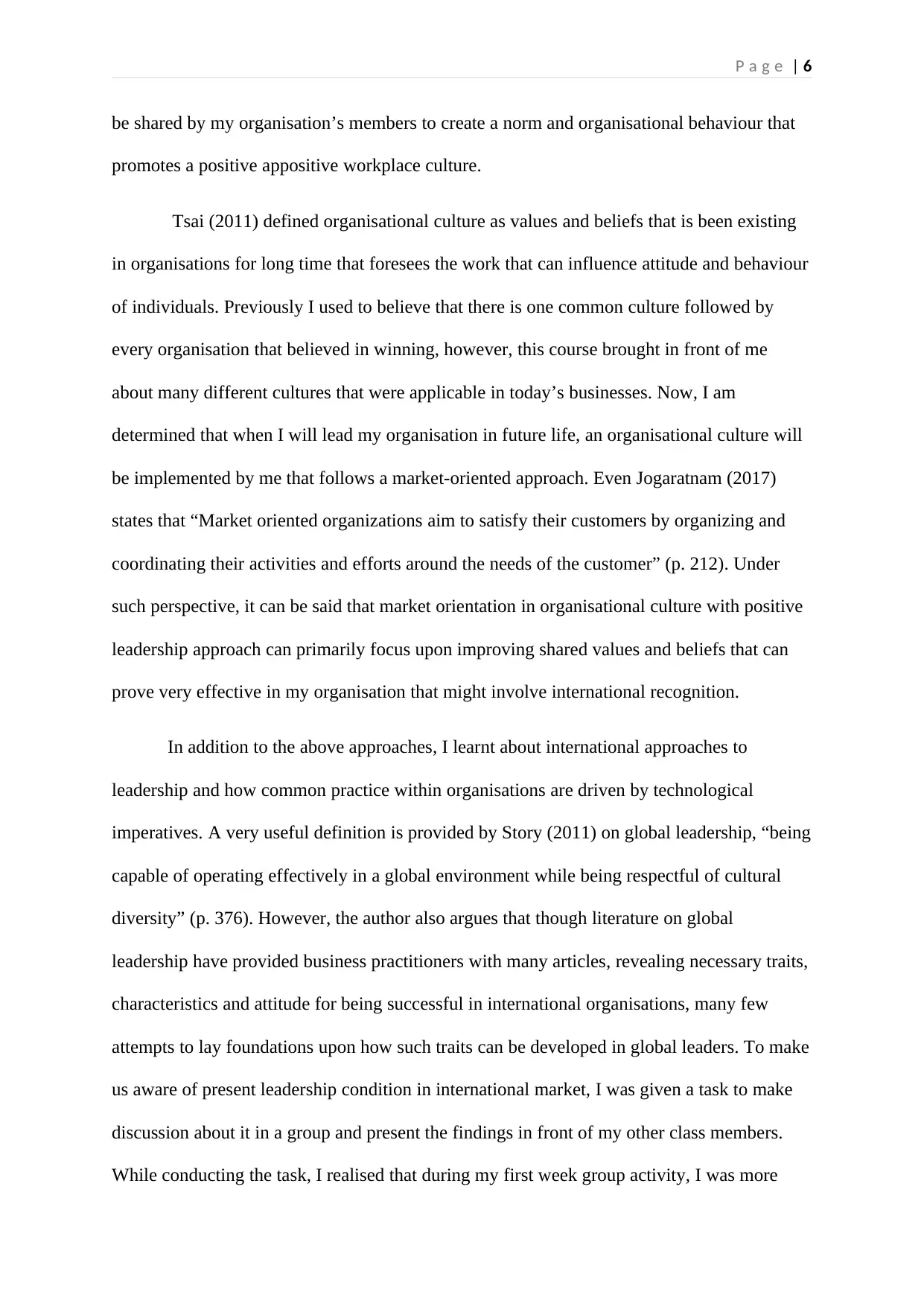
P a g e | 6
be shared by my organisation’s members to create a norm and organisational behaviour that
promotes a positive appositive workplace culture.
Tsai (2011) defined organisational culture as values and beliefs that is been existing
in organisations for long time that foresees the work that can influence attitude and behaviour
of individuals. Previously I used to believe that there is one common culture followed by
every organisation that believed in winning, however, this course brought in front of me
about many different cultures that were applicable in today’s businesses. Now, I am
determined that when I will lead my organisation in future life, an organisational culture will
be implemented by me that follows a market-oriented approach. Even Jogaratnam (2017)
states that “Market oriented organizations aim to satisfy their customers by organizing and
coordinating their activities and efforts around the needs of the customer” (p. 212). Under
such perspective, it can be said that market orientation in organisational culture with positive
leadership approach can primarily focus upon improving shared values and beliefs that can
prove very effective in my organisation that might involve international recognition.
In addition to the above approaches, I learnt about international approaches to
leadership and how common practice within organisations are driven by technological
imperatives. A very useful definition is provided by Story (2011) on global leadership, “being
capable of operating effectively in a global environment while being respectful of cultural
diversity” (p. 376). However, the author also argues that though literature on global
leadership have provided business practitioners with many articles, revealing necessary traits,
characteristics and attitude for being successful in international organisations, many few
attempts to lay foundations upon how such traits can be developed in global leaders. To make
us aware of present leadership condition in international market, I was given a task to make
discussion about it in a group and present the findings in front of my other class members.
While conducting the task, I realised that during my first week group activity, I was more
be shared by my organisation’s members to create a norm and organisational behaviour that
promotes a positive appositive workplace culture.
Tsai (2011) defined organisational culture as values and beliefs that is been existing
in organisations for long time that foresees the work that can influence attitude and behaviour
of individuals. Previously I used to believe that there is one common culture followed by
every organisation that believed in winning, however, this course brought in front of me
about many different cultures that were applicable in today’s businesses. Now, I am
determined that when I will lead my organisation in future life, an organisational culture will
be implemented by me that follows a market-oriented approach. Even Jogaratnam (2017)
states that “Market oriented organizations aim to satisfy their customers by organizing and
coordinating their activities and efforts around the needs of the customer” (p. 212). Under
such perspective, it can be said that market orientation in organisational culture with positive
leadership approach can primarily focus upon improving shared values and beliefs that can
prove very effective in my organisation that might involve international recognition.
In addition to the above approaches, I learnt about international approaches to
leadership and how common practice within organisations are driven by technological
imperatives. A very useful definition is provided by Story (2011) on global leadership, “being
capable of operating effectively in a global environment while being respectful of cultural
diversity” (p. 376). However, the author also argues that though literature on global
leadership have provided business practitioners with many articles, revealing necessary traits,
characteristics and attitude for being successful in international organisations, many few
attempts to lay foundations upon how such traits can be developed in global leaders. To make
us aware of present leadership condition in international market, I was given a task to make
discussion about it in a group and present the findings in front of my other class members.
While conducting the task, I realised that during my first week group activity, I was more
Paraphrase This Document
Need a fresh take? Get an instant paraphrase of this document with our AI Paraphraser
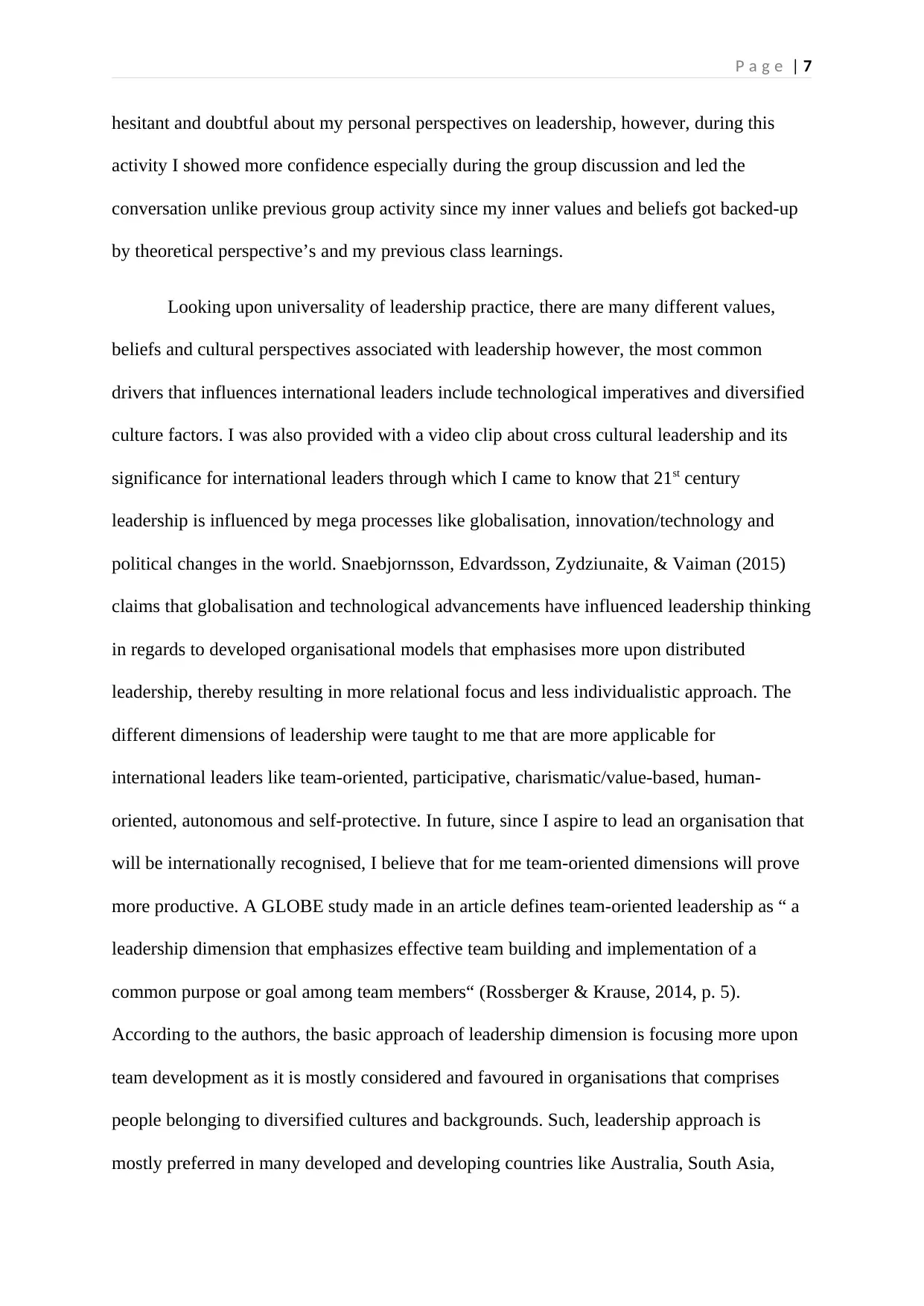
P a g e | 7
hesitant and doubtful about my personal perspectives on leadership, however, during this
activity I showed more confidence especially during the group discussion and led the
conversation unlike previous group activity since my inner values and beliefs got backed-up
by theoretical perspective’s and my previous class learnings.
Looking upon universality of leadership practice, there are many different values,
beliefs and cultural perspectives associated with leadership however, the most common
drivers that influences international leaders include technological imperatives and diversified
culture factors. I was also provided with a video clip about cross cultural leadership and its
significance for international leaders through which I came to know that 21st century
leadership is influenced by mega processes like globalisation, innovation/technology and
political changes in the world. Snaebjornsson, Edvardsson, Zydziunaite, & Vaiman (2015)
claims that globalisation and technological advancements have influenced leadership thinking
in regards to developed organisational models that emphasises more upon distributed
leadership, thereby resulting in more relational focus and less individualistic approach. The
different dimensions of leadership were taught to me that are more applicable for
international leaders like team-oriented, participative, charismatic/value-based, human-
oriented, autonomous and self-protective. In future, since I aspire to lead an organisation that
will be internationally recognised, I believe that for me team-oriented dimensions will prove
more productive. A GLOBE study made in an article defines team-oriented leadership as “ a
leadership dimension that emphasizes effective team building and implementation of a
common purpose or goal among team members“ (Rossberger & Krause, 2014, p. 5).
According to the authors, the basic approach of leadership dimension is focusing more upon
team development as it is mostly considered and favoured in organisations that comprises
people belonging to diversified cultures and backgrounds. Such, leadership approach is
mostly preferred in many developed and developing countries like Australia, South Asia,
hesitant and doubtful about my personal perspectives on leadership, however, during this
activity I showed more confidence especially during the group discussion and led the
conversation unlike previous group activity since my inner values and beliefs got backed-up
by theoretical perspective’s and my previous class learnings.
Looking upon universality of leadership practice, there are many different values,
beliefs and cultural perspectives associated with leadership however, the most common
drivers that influences international leaders include technological imperatives and diversified
culture factors. I was also provided with a video clip about cross cultural leadership and its
significance for international leaders through which I came to know that 21st century
leadership is influenced by mega processes like globalisation, innovation/technology and
political changes in the world. Snaebjornsson, Edvardsson, Zydziunaite, & Vaiman (2015)
claims that globalisation and technological advancements have influenced leadership thinking
in regards to developed organisational models that emphasises more upon distributed
leadership, thereby resulting in more relational focus and less individualistic approach. The
different dimensions of leadership were taught to me that are more applicable for
international leaders like team-oriented, participative, charismatic/value-based, human-
oriented, autonomous and self-protective. In future, since I aspire to lead an organisation that
will be internationally recognised, I believe that for me team-oriented dimensions will prove
more productive. A GLOBE study made in an article defines team-oriented leadership as “ a
leadership dimension that emphasizes effective team building and implementation of a
common purpose or goal among team members“ (Rossberger & Krause, 2014, p. 5).
According to the authors, the basic approach of leadership dimension is focusing more upon
team development as it is mostly considered and favoured in organisations that comprises
people belonging to diversified cultures and backgrounds. Such, leadership approach is
mostly preferred in many developed and developing countries like Australia, South Asia,
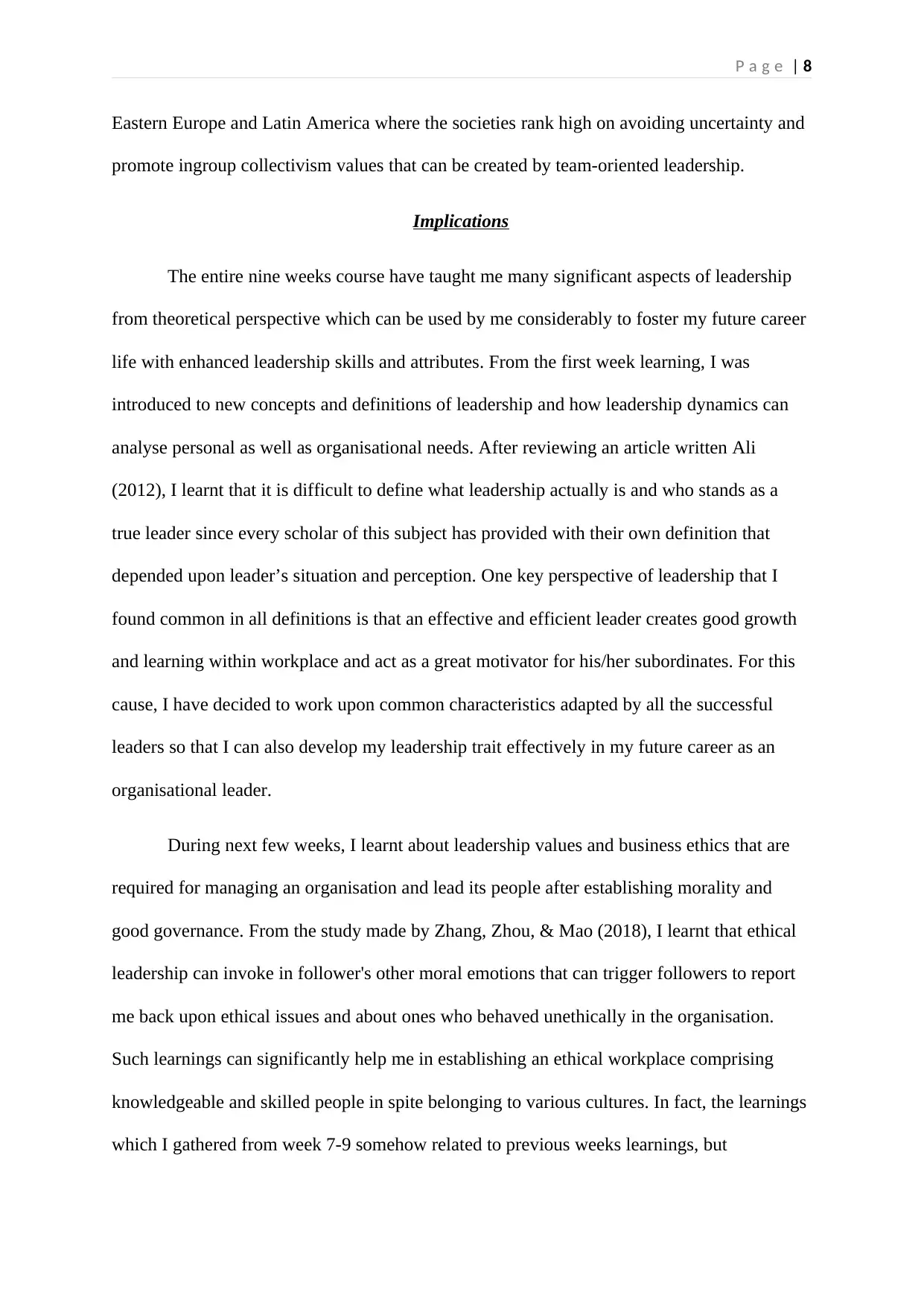
P a g e | 8
Eastern Europe and Latin America where the societies rank high on avoiding uncertainty and
promote ingroup collectivism values that can be created by team-oriented leadership.
Implications
The entire nine weeks course have taught me many significant aspects of leadership
from theoretical perspective which can be used by me considerably to foster my future career
life with enhanced leadership skills and attributes. From the first week learning, I was
introduced to new concepts and definitions of leadership and how leadership dynamics can
analyse personal as well as organisational needs. After reviewing an article written Ali
(2012), I learnt that it is difficult to define what leadership actually is and who stands as a
true leader since every scholar of this subject has provided with their own definition that
depended upon leader’s situation and perception. One key perspective of leadership that I
found common in all definitions is that an effective and efficient leader creates good growth
and learning within workplace and act as a great motivator for his/her subordinates. For this
cause, I have decided to work upon common characteristics adapted by all the successful
leaders so that I can also develop my leadership trait effectively in my future career as an
organisational leader.
During next few weeks, I learnt about leadership values and business ethics that are
required for managing an organisation and lead its people after establishing morality and
good governance. From the study made by Zhang, Zhou, & Mao (2018), I learnt that ethical
leadership can invoke in follower's other moral emotions that can trigger followers to report
me back upon ethical issues and about ones who behaved unethically in the organisation.
Such learnings can significantly help me in establishing an ethical workplace comprising
knowledgeable and skilled people in spite belonging to various cultures. In fact, the learnings
which I gathered from week 7-9 somehow related to previous weeks learnings, but
Eastern Europe and Latin America where the societies rank high on avoiding uncertainty and
promote ingroup collectivism values that can be created by team-oriented leadership.
Implications
The entire nine weeks course have taught me many significant aspects of leadership
from theoretical perspective which can be used by me considerably to foster my future career
life with enhanced leadership skills and attributes. From the first week learning, I was
introduced to new concepts and definitions of leadership and how leadership dynamics can
analyse personal as well as organisational needs. After reviewing an article written Ali
(2012), I learnt that it is difficult to define what leadership actually is and who stands as a
true leader since every scholar of this subject has provided with their own definition that
depended upon leader’s situation and perception. One key perspective of leadership that I
found common in all definitions is that an effective and efficient leader creates good growth
and learning within workplace and act as a great motivator for his/her subordinates. For this
cause, I have decided to work upon common characteristics adapted by all the successful
leaders so that I can also develop my leadership trait effectively in my future career as an
organisational leader.
During next few weeks, I learnt about leadership values and business ethics that are
required for managing an organisation and lead its people after establishing morality and
good governance. From the study made by Zhang, Zhou, & Mao (2018), I learnt that ethical
leadership can invoke in follower's other moral emotions that can trigger followers to report
me back upon ethical issues and about ones who behaved unethically in the organisation.
Such learnings can significantly help me in establishing an ethical workplace comprising
knowledgeable and skilled people in spite belonging to various cultures. In fact, the learnings
which I gathered from week 7-9 somehow related to previous weeks learnings, but
⊘ This is a preview!⊘
Do you want full access?
Subscribe today to unlock all pages.

Trusted by 1+ million students worldwide
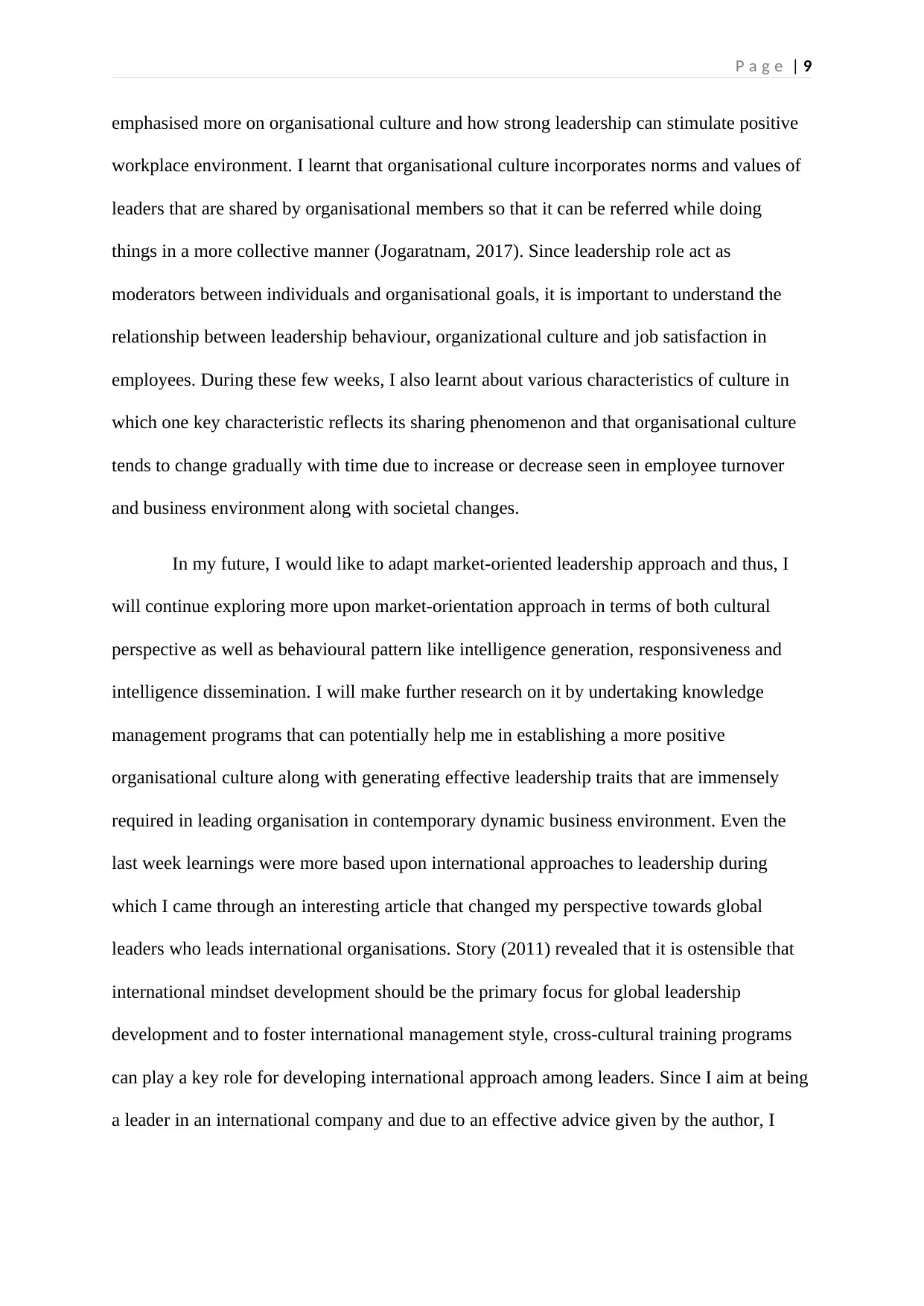
P a g e | 9
emphasised more on organisational culture and how strong leadership can stimulate positive
workplace environment. I learnt that organisational culture incorporates norms and values of
leaders that are shared by organisational members so that it can be referred while doing
things in a more collective manner (Jogaratnam, 2017). Since leadership role act as
moderators between individuals and organisational goals, it is important to understand the
relationship between leadership behaviour, organizational culture and job satisfaction in
employees. During these few weeks, I also learnt about various characteristics of culture in
which one key characteristic reflects its sharing phenomenon and that organisational culture
tends to change gradually with time due to increase or decrease seen in employee turnover
and business environment along with societal changes.
In my future, I would like to adapt market-oriented leadership approach and thus, I
will continue exploring more upon market-orientation approach in terms of both cultural
perspective as well as behavioural pattern like intelligence generation, responsiveness and
intelligence dissemination. I will make further research on it by undertaking knowledge
management programs that can potentially help me in establishing a more positive
organisational culture along with generating effective leadership traits that are immensely
required in leading organisation in contemporary dynamic business environment. Even the
last week learnings were more based upon international approaches to leadership during
which I came through an interesting article that changed my perspective towards global
leaders who leads international organisations. Story (2011) revealed that it is ostensible that
international mindset development should be the primary focus for global leadership
development and to foster international management style, cross-cultural training programs
can play a key role for developing international approach among leaders. Since I aim at being
a leader in an international company and due to an effective advice given by the author, I
emphasised more on organisational culture and how strong leadership can stimulate positive
workplace environment. I learnt that organisational culture incorporates norms and values of
leaders that are shared by organisational members so that it can be referred while doing
things in a more collective manner (Jogaratnam, 2017). Since leadership role act as
moderators between individuals and organisational goals, it is important to understand the
relationship between leadership behaviour, organizational culture and job satisfaction in
employees. During these few weeks, I also learnt about various characteristics of culture in
which one key characteristic reflects its sharing phenomenon and that organisational culture
tends to change gradually with time due to increase or decrease seen in employee turnover
and business environment along with societal changes.
In my future, I would like to adapt market-oriented leadership approach and thus, I
will continue exploring more upon market-orientation approach in terms of both cultural
perspective as well as behavioural pattern like intelligence generation, responsiveness and
intelligence dissemination. I will make further research on it by undertaking knowledge
management programs that can potentially help me in establishing a more positive
organisational culture along with generating effective leadership traits that are immensely
required in leading organisation in contemporary dynamic business environment. Even the
last week learnings were more based upon international approaches to leadership during
which I came through an interesting article that changed my perspective towards global
leaders who leads international organisations. Story (2011) revealed that it is ostensible that
international mindset development should be the primary focus for global leadership
development and to foster international management style, cross-cultural training programs
can play a key role for developing international approach among leaders. Since I aim at being
a leader in an international company and due to an effective advice given by the author, I
Paraphrase This Document
Need a fresh take? Get an instant paraphrase of this document with our AI Paraphraser
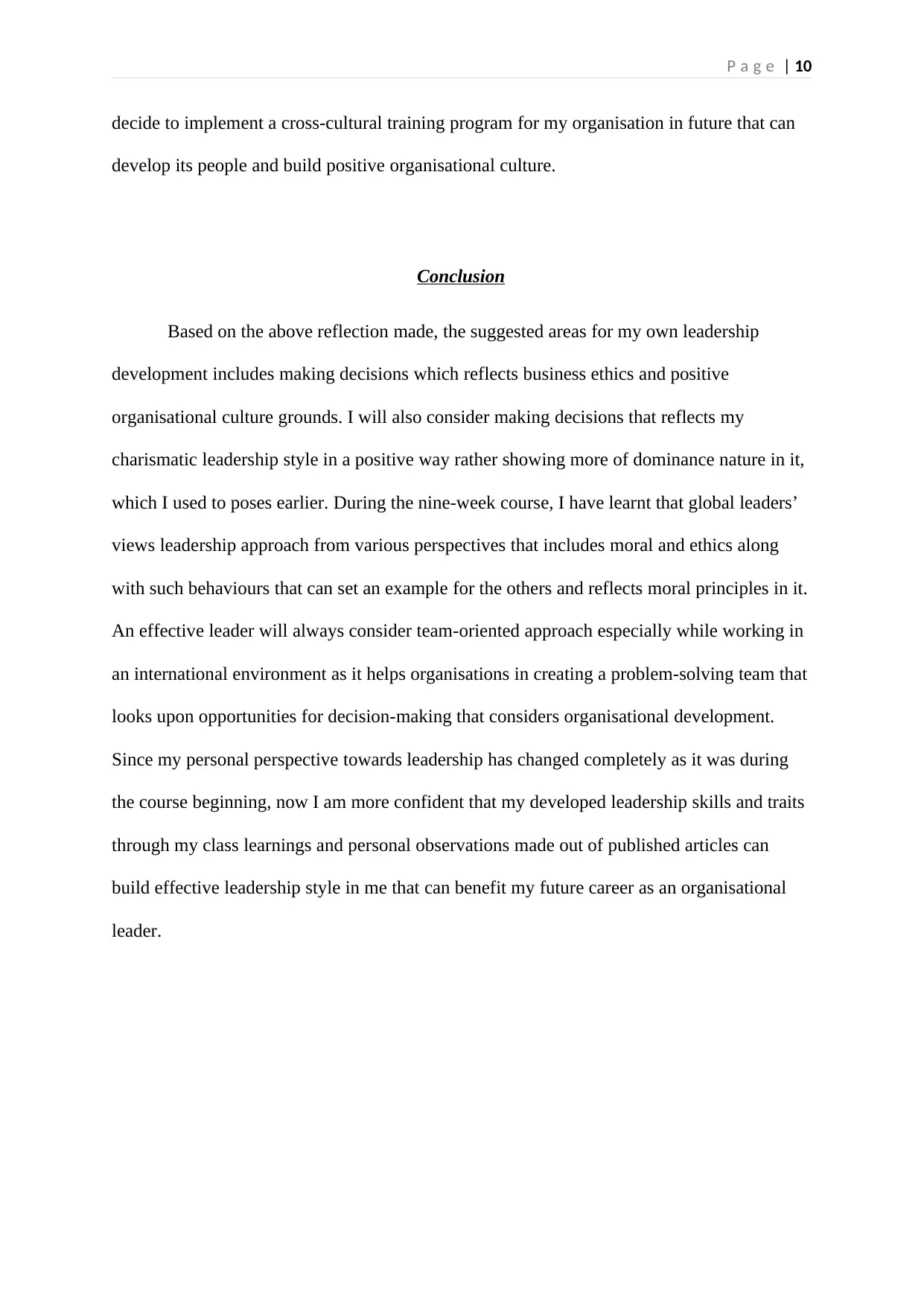
P a g e | 10
decide to implement a cross-cultural training program for my organisation in future that can
develop its people and build positive organisational culture.
Conclusion
Based on the above reflection made, the suggested areas for my own leadership
development includes making decisions which reflects business ethics and positive
organisational culture grounds. I will also consider making decisions that reflects my
charismatic leadership style in a positive way rather showing more of dominance nature in it,
which I used to poses earlier. During the nine-week course, I have learnt that global leaders’
views leadership approach from various perspectives that includes moral and ethics along
with such behaviours that can set an example for the others and reflects moral principles in it.
An effective leader will always consider team-oriented approach especially while working in
an international environment as it helps organisations in creating a problem-solving team that
looks upon opportunities for decision-making that considers organisational development.
Since my personal perspective towards leadership has changed completely as it was during
the course beginning, now I am more confident that my developed leadership skills and traits
through my class learnings and personal observations made out of published articles can
build effective leadership style in me that can benefit my future career as an organisational
leader.
decide to implement a cross-cultural training program for my organisation in future that can
develop its people and build positive organisational culture.
Conclusion
Based on the above reflection made, the suggested areas for my own leadership
development includes making decisions which reflects business ethics and positive
organisational culture grounds. I will also consider making decisions that reflects my
charismatic leadership style in a positive way rather showing more of dominance nature in it,
which I used to poses earlier. During the nine-week course, I have learnt that global leaders’
views leadership approach from various perspectives that includes moral and ethics along
with such behaviours that can set an example for the others and reflects moral principles in it.
An effective leader will always consider team-oriented approach especially while working in
an international environment as it helps organisations in creating a problem-solving team that
looks upon opportunities for decision-making that considers organisational development.
Since my personal perspective towards leadership has changed completely as it was during
the course beginning, now I am more confident that my developed leadership skills and traits
through my class learnings and personal observations made out of published articles can
build effective leadership style in me that can benefit my future career as an organisational
leader.
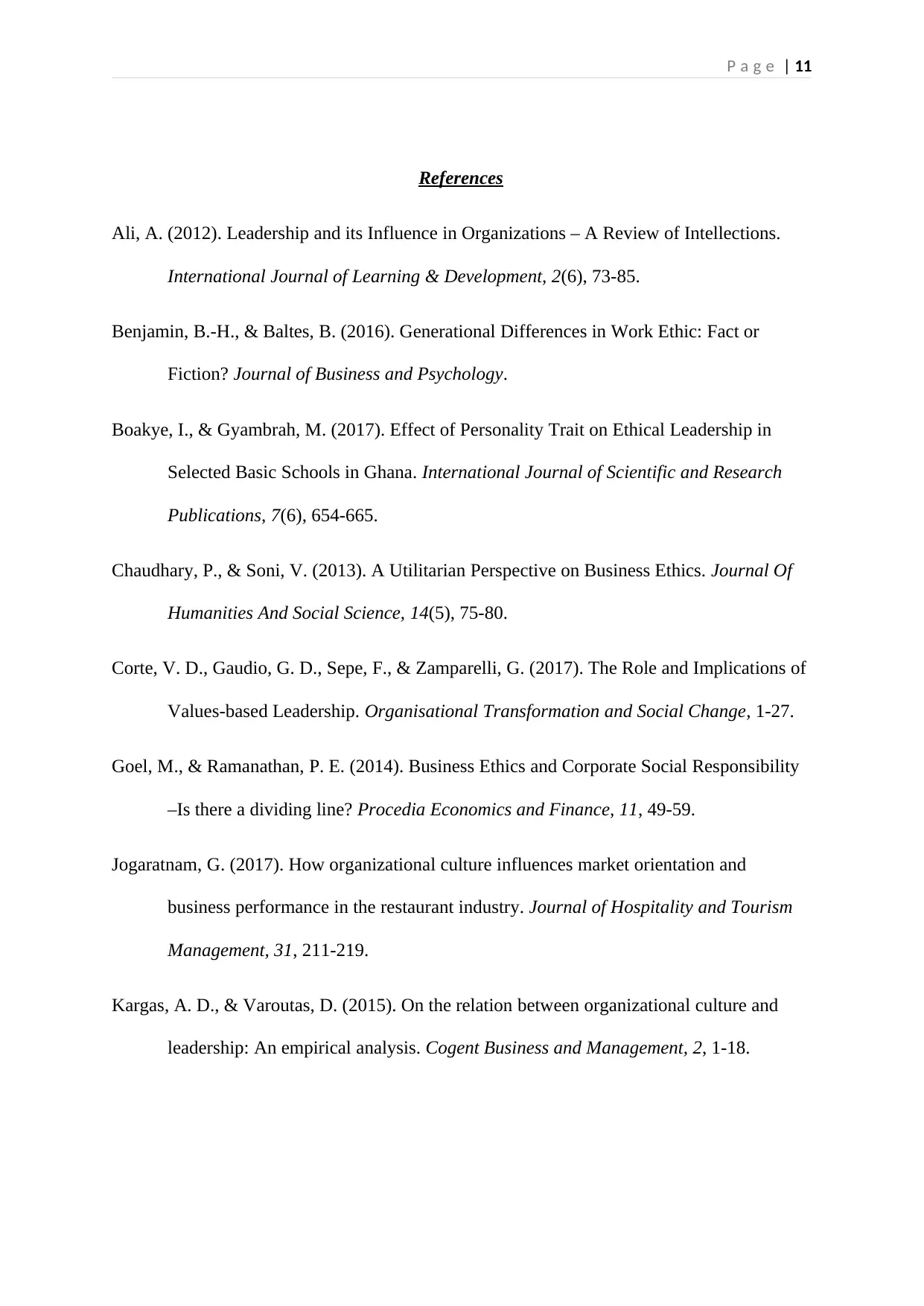
P a g e | 11
References
Ali, A. (2012). Leadership and its Influence in Organizations – A Review of Intellections.
International Journal of Learning & Development, 2(6), 73-85.
Benjamin, B.-H., & Baltes, B. (2016). Generational Differences in Work Ethic: Fact or
Fiction? Journal of Business and Psychology.
Boakye, I., & Gyambrah, M. (2017). Effect of Personality Trait on Ethical Leadership in
Selected Basic Schools in Ghana. International Journal of Scientific and Research
Publications, 7(6), 654-665.
Chaudhary, P., & Soni, V. (2013). A Utilitarian Perspective on Business Ethics. Journal Of
Humanities And Social Science, 14(5), 75-80.
Corte, V. D., Gaudio, G. D., Sepe, F., & Zamparelli, G. (2017). The Role and Implications of
Values-based Leadership. Organisational Transformation and Social Change, 1-27.
Goel, M., & Ramanathan, P. E. (2014). Business Ethics and Corporate Social Responsibility
–Is there a dividing line? Procedia Economics and Finance, 11, 49-59.
Jogaratnam, G. (2017). How organizational culture influences market orientation and
business performance in the restaurant industry. Journal of Hospitality and Tourism
Management, 31, 211-219.
Kargas, A. D., & Varoutas, D. (2015). On the relation between organizational culture and
leadership: An empirical analysis. Cogent Business and Management, 2, 1-18.
References
Ali, A. (2012). Leadership and its Influence in Organizations – A Review of Intellections.
International Journal of Learning & Development, 2(6), 73-85.
Benjamin, B.-H., & Baltes, B. (2016). Generational Differences in Work Ethic: Fact or
Fiction? Journal of Business and Psychology.
Boakye, I., & Gyambrah, M. (2017). Effect of Personality Trait on Ethical Leadership in
Selected Basic Schools in Ghana. International Journal of Scientific and Research
Publications, 7(6), 654-665.
Chaudhary, P., & Soni, V. (2013). A Utilitarian Perspective on Business Ethics. Journal Of
Humanities And Social Science, 14(5), 75-80.
Corte, V. D., Gaudio, G. D., Sepe, F., & Zamparelli, G. (2017). The Role and Implications of
Values-based Leadership. Organisational Transformation and Social Change, 1-27.
Goel, M., & Ramanathan, P. E. (2014). Business Ethics and Corporate Social Responsibility
–Is there a dividing line? Procedia Economics and Finance, 11, 49-59.
Jogaratnam, G. (2017). How organizational culture influences market orientation and
business performance in the restaurant industry. Journal of Hospitality and Tourism
Management, 31, 211-219.
Kargas, A. D., & Varoutas, D. (2015). On the relation between organizational culture and
leadership: An empirical analysis. Cogent Business and Management, 2, 1-18.
⊘ This is a preview!⊘
Do you want full access?
Subscribe today to unlock all pages.

Trusted by 1+ million students worldwide
1 out of 15
Related Documents
Your All-in-One AI-Powered Toolkit for Academic Success.
+13062052269
info@desklib.com
Available 24*7 on WhatsApp / Email
![[object Object]](/_next/static/media/star-bottom.7253800d.svg)
Unlock your academic potential
Copyright © 2020–2026 A2Z Services. All Rights Reserved. Developed and managed by ZUCOL.





